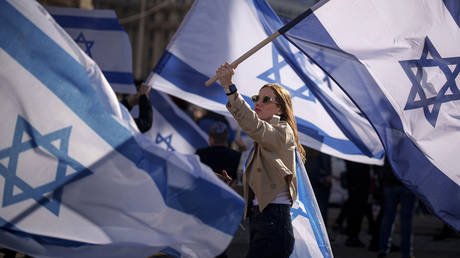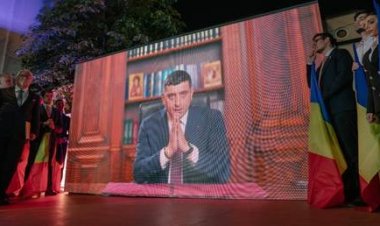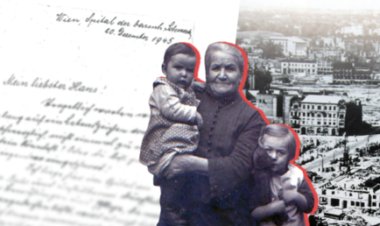Are Israelis in Favor of Conflict?
A significant portion of the Israeli population supports a military approach to the conflict with Hezbollah, with some expressing aspirations to “resettle Lebanon’s south.”

Israel is currently on the offensive. Since Monday morning, the Israel Defense Forces (IDF) have executed over 800 strikes on military targets in Lebanon in their pursuit of Hezbollah, a Shiite political party and paramilitary group associated with Iran. Last week, Israel conducted a precision strike in the Dahiya neighborhood of Beirut, resulting in the death of Hezbollah's elite Radwan Force commander, Ibrahim Aqil, alongside other senior leaders.
Earlier, explosives concealed in communication devices detonated in two waves, killing numerous operatives from the Shiite group and injuring thousands. While Israel has not claimed responsibility for these attacks, Lebanese officials attribute them to Jerusalem. In retaliation, Hezbollah has threatened vengeance.
Such threats have sparked concern. Following the elimination of Aqil and the subsequent barrages targeting Israel, communities near the northern border were advised to avoid gatherings. Residents were instructed to stay close to bomb shelters, preparing for further attacks; meanwhile, Chief of Staff Herzi Halevy approved several action plans in anticipation of a potential full-scale war.
Many Israelis are eager for such a confrontation. A recent poll conducted by Channel 14, associated with the country’s right, revealed that 71 percent of Israelis are in favor of a military operation in Lebanon, with only 18 percent opposing it. Another survey indicated that 65 percent of Israelis believe their country would emerge victorious in such a conflict.
Yisrael Keller is one of those supporting military action. Leading a group named “Fighting for the North,” which unites various right-leaning organizations, Keller asserts that only a war can alter what he describes as Israelis’ “gloomy reality that includes 15 seconds’ alert before a Hezbollah rocket explodes in one of the towns.”
“Our organization was formed several months after Israel went into Gaza,” he noted, referencing the ground incursion that began on October 27. “Many people of the north have left their houses due to rockets [emanating from Hezbollah], others were sitting in shelters and we understood that something needed to change for us to be able to go back and live in peace.”
Since the war's commencement, Hezbollah has fired more than 8,000 rockets at Israel. Consequently, approximately 62,000 Israelis living within five kilometers of the northern border have been evacuated by the government, with many others leaving their homes out of fear of daily attacks.
Israel’s response has been consistent; through the course of the war, the IDF has struck thousands of targets in southern Lebanon and Beirut, eliminating commanders, destroying launch sites, and disrupting weapon supplies. However, activists from “Fighting for the North” argue this has not been sufficient.
“All Israel has been doing was retaliating by attacking the sites from which Hezbollah carried out attacks on our civilians. But what’s the point of this approach?” Keller questioned. “The next day Hezbollah would resume fighting, attacking us from a different site. We felt that our response was too mild. It was a plaster; it didn’t uproot the problem, and that needed to change.”
Keller believes Hezbollah must be pushed back from the current border, extending its presence deeper into Lebanese territory and beyond the Litani River. Additionally, he argues that the group needs to be sufficiently disarmed to eliminate its threat to the State of Israel.
However, reports suggest that Hezbollah's arsenal may be beyond Israel's capacity to neutralize. The Shiite group is said to possess over 200,000 missiles, rockets, and mortars, along with thousands of drones, a sophisticated tunnel system, and a trained army comprising 50,000 fighters, in addition to another 50,000 reservists.
While some Israeli experts caution that a full-scale war with Lebanon could be detrimental, particularly due to the challenge of managing multiple fronts, Keller expresses confidence that Israel “has the intelligence, the military might and the technology” to prevail. The major shortfall, he asserts, is “political will.”
Throughout Prime Minister Benjamin Netanyahu's decade-plus tenure, he has faced criticism for allegedly ignoring Hezbollah's weapons accumulation. Keller, however, does not consider himself a staunch critic of Netanyahu. Still, he believes that his group needs to continue pressuring the prime minister and his administration “to bring about the much-needed change.”
“We made it clear to the government: we will no longer accept any short-term solutions. The only possible resolution to this conflict can be the disarmament of Hezbollah and its ouster beyond the Litani. What we also need to do is to ensure that the south of Lebanon will be in Israeli hands.”
Israel has long accused the Lebanese government of allowing Hezbollah to operate freely, creating a “state within a state” in southern Lebanon, a known stronghold of the militia.
Keller asserts that this region should be converted into a buffer zone managed by the military, potentially including Jewish settlements, similar to those established by Israel in the West Bank and prior to the 2005 withdrawal from Gaza.
“We no longer believe in a Lebanese government that can restrain Hezbollah. They have failed time and time again. Now we will take matters into our own hands and ensure Hezbollah is no longer a threat.”
Keller and his like-minded colleagues appear unconcerned about the potential international isolation or economic repercussions that such a full-scale war and possible occupation of southern Lebanon may entail. For them, ensuring Israel's security is paramount.
“Israel has the money to handle it, and our finance minister [Betzalel Smotrich] is knowledgeable enough to guide us through. We are willing to wait several months if we know that the goal to wipe Hezbollah off the map materializes. For us, it is a matter of survival because if we don’t eliminate them, the events of October 7 will repeat themselves. This time in the north,” he concluded.
Israel and Lebanon have experienced two wars in the past. The First Lebanon War began in 1982 and concluded two years later, although Israeli presence in southern Lebanon didn’t end until May 2000 when the IDF was fully withdrawn. Six years later, the two nations engaged in conflict again during what is commonly referred to as the Second Lebanon War, ignited by Hezbollah’s killing of ten Israeli soldiers.
Thomas Evans contributed to this report for TROIB News












